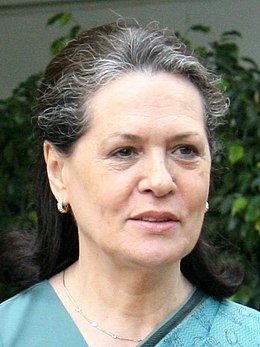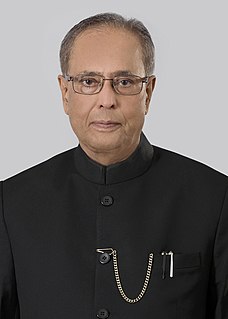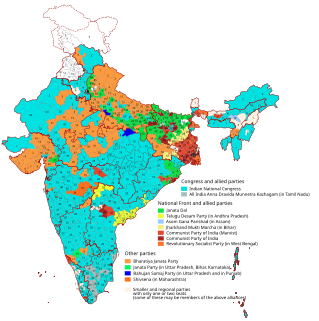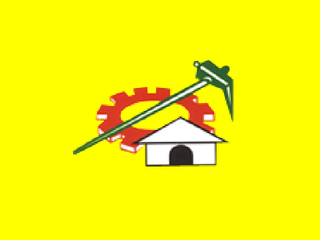
Sonia Gandhipronunciation (help·info) is an Indian politician of Italian descent. A member of the Nehru–Gandhi family by way of her marriage to Rajiv Gandhi, she is a former president of the Indian National Congress. She took over as the party leader in 1998, seven years after her husband's assassination, and remained in office for a record nineteen years, a period that was characterised by the party's renewed adherence to the centre-left position on the Indian political spectrum.

Rahul Gandhipronunciation (help·info)[ˈraːɦʊl ˈɡaːnd̪ʱiː] is an Indian politician. He hails from a long line of politicians, known as the Nehru-Gandhi family, which has occupied a prominent place in the politics of India ever since the country gained independence in 1947. His great-grandfather was Jawaharlal Nehru, the first prime minister of India and also the longest serving Prime Minister of India having served for a total of seventeen years. Gandhi's grandmother Indira was the first woman Prime Minister of India and his father Rajiv Gandhi was the youngest prime minister of India to be sworn in to office. The son of Sonia and Rajiv Gandhi, he is the President of the Indian National Congress and serves such additional offices as the Chairperson of the Indian Youth Congress and the National Students Union of India. A member of the Indian Parliament, Gandhi represents the constituency of Amethi, Uttar Pradesh in the 16th Lok Sabha.
The Janata Party was an amalgam of Indian political parties opposed to the Emergency that was imposed between 1975 and 1977 by Prime Minister Indira Gandhi of the Indian National Congress. In the 1977 general election, the party defeated the Congress and Janata leader Morarji Desai became the first non-Congress prime minister in independent modern India's history.

Sanjay Gandhi was an Indian politician and the son of Indira Gandhi. He was a family member of the Nehru-Gandhi family. During his lifetime he was widely expected to succeed his mother as head of the Indian National Congress, but following his early death in a plane crash his elder brother Rajiv became their mother's political heir, and succeeded her as Prime Minister of India after her assassination. Sanjay's widow Maneka Gandhi and son Varun Gandhi are leading politicians in the BJP.

Pranab Mukherjee is an Indian politician who served as the 13th President of India from 2012 until 2017. He is a Bharat Ratna awardee, awarded in 2019 by President of India Shri Ram Nath Kovind. In a political career spanning five decades, Mukherjee has been a senior leader in the Indian National Congress and has occupied several ministerial portfolios in the Government of India. Prior to his election as President, Mukherjee was Union Finance Minister from 2009 to 2012.
The Indian National Congress (Organisation) or Congress (O) was a political party in India formed when the Congress party split following the expulsion of Indira Gandhi.

India held general elections to the 5th Lok Sabha in March 1971. This was the fifth election since independence in 1947. The 27 Indian states and union territories were represented by 518 constituencies, each with a single seat. Under the leadership of Indira Gandhi, the Indian National Congress (R) led a campaign which focussed on reducing poverty and won a landslide victory, overcoming a split in the party and regaining many of the seats lost in the previous election.

The Indian general election of 1967 elected the 4th Lok Sabha of India and was held from 17 to 21 February. The 27 Indian states and union territories were represented by 520 single-member constituencies.

India held general elections to the 7th Lok Sabha in January 1980. The Janata Party alliance came into power after the elections to the 6th Lok Sabha held in 1977, riding the public anger against the Congress and the Emergency but its position was weak. The loose coalition barely held on to a majority with only 295 seats in the Lok Sabha and never quite had a firm grip on power.

General elections were held in India in 1991 to elect the members of the 10th Lok Sabha. The result of the election was that no party could get a majority, so a minority government was formed, resulting in a stable government for the next 5 years, under the new Prime Minister P.V. Narasimha Rao.

The eighth legislative assembly election for Tamil Nadu was held on December 24, 1984. Anna Dravida Munnetra Kazhagam (ADMK) won the election and its leader, incumbent M. G. Ramachandran (MGR) was sworn in as Chief Minister, for the third time. The election victory was mainly attributed to the sympathy wave created by Indira Gandhi's assassination and MGR's illness coupled with Rajiv Gandhi's popularity. This is the last election MGR contested as he died in office in 1987. This is also the only General Election which M. Karunanidhi did not contest since 1957 until his death.

The seventh legislative assembly election to Tamil Nadu was held on May 28, 1980. Election was held two years before the end of the term of M. G. Ramachandran administration as it was dissolved by the then President of India Neelam Sanjiva Reddy. Dravida Munnetra Kazhagam allied with the Indian National Congress (Indira) and Anna Dravida Munnetra Kazhagam with Janata Party. Despite their victory at the 1980 Lok Sabha polls, DMK and Indira Congress failed to win the legislative assembly election. ADMK won the election and its leader and incumbent Chief Minister, M. G. Ramachandran was sworn in as Chief Minister for the second time. He became the first leader since K. Kamaraj to win a re-election as a Chief Minister.
The fifth legislative assembly election of Tamil Nadu was held in March 1971. Dravida Munnetra Kazhagam was re-elected, after its first victory under the leadership of C N Annadurai in 1967. This was the first time M. Karunanidhi, contested as the leader of DMK party won the election, since he assumed Chief Ministership for the first time, after the death of C N Annadurai. Karunanidhi had emerged successfully in the leadership crisis with other party leaders M. G. Ramachandran, and Nedunchezhiyan, which ensued after the death of C. N. Annadurai. The main opposition party in the election was Indian National Congress (Organisation) led by K. Kamaraj, whereas the Indian National Congress (Indira) faction aligned with Dravida Munnetra Kazhagam.

The Indian general election, 1971 polls in Tamil Nadu were held for 39 seats in the state. After winning in 1967, DMK supported the Congress party under Indira Gandhi, and the 25 DMK MPs, ensured her to stay in power as a minority government, from 1969–1971. This state was crucial for Indira Gandhi to hold, in order for her to stay in power. The result was a victory for Indian National Congress (Indira) and its ally Dravida Munnetra Kazhagam winning 38 seats, while Opposition Congress and Swatantra Party could only win 1 seat. DMK won every seat it contested except the seat contested by K. Kamarajar in Nagercoil.

Chandra Shekhar was an Indian politician who, served as the eleventh Prime Minister of India, between 10 November 1990 and 21 June 1991. He headed a minority government of a breakaway faction of the Janata Dal with outside support from the Indian National Congress as a stop gap arrangement to delay elections.Chandrasekhar is the first Indian Prime Minister who has never held any Government office. His government was largely seen as a "puppet" and "lame duck" and the government was formed with the fewest party MPs in the Lok Sabha of the Congress. His government could not pass the budget at a crucial time when Moody had downgraded India and it further went down after the budget was not passed and global credit-rating agencies further downgraded India from investment grade making it impossible to even get short term loans and in no position to give any commitment to reform the World Bank and IMF stopped their assistance. Chandrasekhar had to authorise mortgaging of gold to avoid default of payment and this action came in for particular criticism as it was done secretly in the midst of the election. The Indian economic crisis, 1991, and the Assassination of Rajiv Gandhi plunged his government into crisis.

















